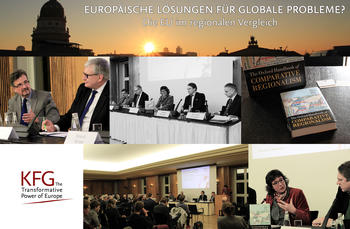Report: Roundtable "European Solutions for Global Problems? The European Union and Comparative Regionalism"
Jun 08, 2017
As the final event of the Oxford Handbook of Comparative Regionalism book tour, the KFG hosted the panel discussion „European Solutions for Global Problems? The European Union and Comparative Regionalism” on 15 February 2017 at the Berlin-Brandenburg Academy of Sciences and Humanities.
Prof. Dr. Tanja Börzel moderated the discussion between:
- Thomas Binder (Head of the Subsection for EU and International Affairs at the Federal Ministry of the Interior)
- Thomas Ossowski (Commissioner for Relations to the Member States of the European Union as well as Transnational and Regional Cooperation at the German Federal Foreign Office)
- Bernhard Schnittger (Deputy Head of the Office of the European Commission in Germany)
- Prof. Dr. Thomas Risse (Director of the Center for Transnational Relations, Foreign and Security Policy at the Otto Suhr Institute of Political Science at the Freie Universität Berlin)
The discussion evolved around the ability of regional organizations, including the EU, to solve global and supra-regional problems, such as migration, environment, peace and security issues. In face of the steadily rising Euroscepticism and the consequent urge to defend the EU, the discussion became very heated at some stages, especially when the audience took part in the debate.
Opening Statements
Starting the exchange, each panelist gave a short opening statement. For Thomas Binder it was clear that the EU has to offer a high capacity in tackling security issues that no single state would be able to offer on its own. He named common databases as an example of how to properly fight terrorism.
Thomas Ossowski agreed and added that the European Union is an attractive political institution largely due to its nature as a community of shared values. Consequently, the EU would serve as a catalyst for democratization processes. But after the rejection of a common European constitution by France and the Netherlands and the widespread fear that the EU might become a federal state or even a ‘super state,’ the EU has suffered from multiple crises and has been faced with strong opposition against any deeper integration. In the end, Thomas Ossowski addressed the European youth: “Why isn’t the ‘Generation Erasmus’ defending the EU more vehemently?”
Similarly, Bernhard Schnittger highlighted the character of the EU as an institution ‘sui generis’ and pointed out that the EU is not comparable to other regional institutions. The EU not only adds new member states but also accelerates deeper integration, which is “clearly written in the treaties.”
Finally, Prof. Dr. Thomas Risse stated that integration is always caused by functional deficits of the institutional status quo. If a problem cannot be adequately solved by a single state, cooperation will occur. Furthermore, regional integration could also happen without economic motives, for example when security and peace are threatened. When it comes to the EU and the question of how integrated and capable the EU is, one should take a differentiated approach. On the one hand, some regional organizations are more deeply integrated in certain policy fields where EU integration remains rather shallow. On the other hand, the EU covers a larger number of policy fields than any other regional institution. Regarding the current capacity in problem solving, the EU cannot be expected to be better than other regional organizations, especially not in handling migration. Nonetheless, the EU had been an institutional role model for other regional organizations in the past, such as ASEAN, due to similar regional challenges.
Discussion
After the opening statements, the panelists discussed current problems and the strategy of the European Union, and finally the audience joined the discussion. Thomas Ossowski’s main argument in favor of a strong European Union was builds on the premise that member states would not have enough impact defending their interests in an international environment without the common voice of the European Union. He identified the EU’s current main problem as a loss of basic consent on certain shared values manifested in Article 2 of the Treaty on European Union. Later on, a guest stated critically that the clarity of these values was at least doubtful. Opposing this criticism, Prof. Dr. Tanja Börzel read out loud Article 2, which created a very “European atmosphere” in the room.
Thomas Binder took a more critical position towards the EU, noting that one should have listened to Great Britain’s objections earlier, before Brexit. Overall, he sensed the future of the European decision-making mechanism in ‘decision by consent’ rather than ‘decision by majority’. Even now, the EU does not have enough instruments to enforce certain policies in the member states – for example, infringement proceedings do not work for the issue of migration.
Regarding the rise of nationalistic populism, Ossowski urged not to react to every small provocation. This strategy would only strengthen the populists’ position. The audience, however, was not fully satisfied with this strategy. One guest countered that social injustice might be the breeding ground of this phenomenon and should therefore be taken more seriously in opposing nationalism and populism.
Finally, the discussion distillated to the question of European Identity. What is more important for a well-working regional organization, economic interdependence or a common identity? Prof. Dr. Thomas Risse ascertained that the founding narrative of each regional organization included certain shared values – even NAFTA was built on idealistic grounds. At the same time, following Risse, no regional organization can be the one and only guarantor for building a common identity.
The event set out to review the European Union’s current challenges in comparison to other regional organizations. Nonetheless, Prof. Dr. Tanja Börzel concluded that the EU can be viewed as a successful and significant political project. The influx of migrants who seek to live in Europe supports this claim.
Marie-Thérèse Schreiber/ Luisa Linke-Behrens
